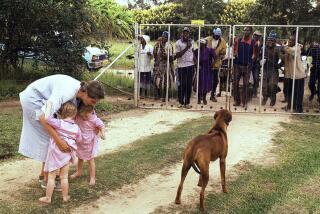Dole Says U.S. Cannot Help Every Farmer
- Share via
WASHINGTON — Drawing a battle line for this week’s Senate debate on additional aid for U.S. farmers, Senate Majority Leader Robert J. Dole (R-Kan.) said Sunday that the Administration is prepared to spend whatever is required to carry out its emergency farm credit program but warned that it will not “help every farmer in every state.”
“We’re serious about it. We’re concerned about farmers,” Dole told a conference on the nation’s farm crisis. “But I also believe we have to be very candid: We’re not going to be able to help every farmer.”
Dole addressed the meeting, made up primarily of legislators and officials from Midwestern grain-growing states, after Agriculture Secretary John R. Block promised in a television interview that “there will be adequate funding” for the relief effort, made up of loan guarantees and direct loans.
Challenge Expected
“We will implement these programs aggressively, immediately,” Block said in an interview on NBC-TV’s “Meet the Press.”
Dole and Block were reinforcing Administration positions that will be challenged this week when the Republican-controlled Senate follows through on a compromise agreement to consider four amendments offered by each party for additional emergency farm relief.
The agreement, which ended a filibuster by Farm Belt senators that had held up confirmation of Edwin Meese III as attorney general for four days, will offer Democrats a new opportunity to score political points against the Administration over the issue of farm debt.
Thousands of farmers face bankruptcy and foreclosure actions as a result of falling prices for crops and farmland and high debts incurred during more prosperous times in the last decade. The Administration says its program would help cash-poor farmers by guaranteeing up to 90% of the principal of loans obtained for spring planting.
Congressional Democrats argue that the guarantees are difficult to obtain and are pushing for more extensive relief.
Although the amount now earmarked for the loan guarantee program is $625 million, Block has said that more funds would be made available as needed.
‘Program in Place’
Dole, stressing that point Sunday, said: “We have a program in place. There’s no cap on it. . . . It’s not $625 million. It’s going to be adequate resources. If it’s going to be $1 billion, it’s going to be $1 billion. If it’s going to be $2 billion, it’s going to be $2 billion.”
Dole was skeptical in his talk to the farm group about chances for passage of amendments to the program, advising his audience: “If you don’t like what you have, I’m not certain you’re going to get much more.”
Questioning the wisdom of one pending amendment to the emergency program that would accelerate federal payments to farmers who participate in U.S. crop loan programs, Dole asked: “If you start advancing farmers a third or a half, what are they going to have when they harvest? Nothing.”
Help for Needy Farmers
“If we’re going to go down this path,” he added, “we ought to make certain that it goes to farmers in need, not every farmer, because it’s going to be a windfall to the majority, and those at the bottom are still going to be at the bottom.”
Despite the current crisis, Block said the Administration would move forward on its plan to reduce the federal level of support for farmers in the long term.
He said subsidy programs initiated under previous administrations “have delivered to the farmer more pain than protection. They have forced many farmers to become more dependent on government than they liked to be, and now they find that they’re hooked on government.”
Besides, he said, “everyone is ready to address someone else’s government spending but not the spending that is good for them. They say cut those programs, don’t cut mine. We can no longer afford that kind of luxury.”
Block also said that President Reagan is deeply concerned about the plight of farmers. “There isn’t a person in this town more sensitive and has greater love for rural America than President Ronald Reagan,” he said.
More to Read
Get the L.A. Times Politics newsletter
Deeply reported insights into legislation, politics and policy from Sacramento, Washington and beyond. In your inbox twice per week.
You may occasionally receive promotional content from the Los Angeles Times.









